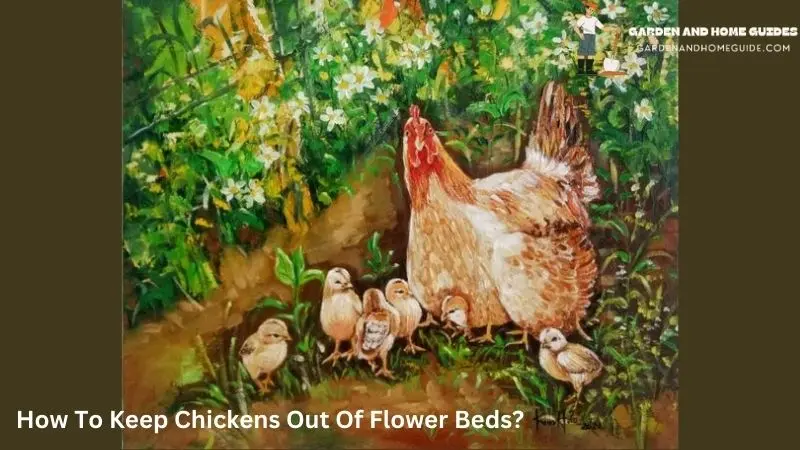Life Tips
How To Keep Chickens Out Of Flower Beds?
The joy of tending a vibrant flower garden can be quickly diminished by the unwelcome presence of chickens. These feathered friends, while delightful in many ways, have a penchant for scratching and pecking, which can wreak havoc on delicate blooms and carefully cultivated beds.
The frustration of seeing your meticulously planted flowers trampled and devoured can be disheartening. However, with a combination of preventative measures and creative solutions, you can effectively keep chickens out of your flower beds and preserve the beauty of your garden.
Let’s learn more about how to keep chickens out of flower beds with gardenandhomeguide.com in the article below!
Understanding the Chicken’s Perspective
Before diving into specific methods, it’s crucial to understand why chickens are drawn to flower beds in the first place. Their natural instinct to scratch and forage for food often leads them to explore the soil, seeking insects, seeds, and other tasty morsels. The soft, moist soil of a flower bed is particularly inviting, especially when compared to the harder, drier ground elsewhere in the yard. Additionally, the colorful blooms and lush greenery can be tempting, especially for curious chickens who might mistake them for edible treats.
How To Keep Chickens Out Of Flower Beds?
Creating Physical Barriers
The most effective way to keep chickens out of your flower beds is to create physical barriers that discourage them from entering. These barriers can range from simple and inexpensive options to more elaborate and permanent structures.
- Chicken Wire Fencing: A simple and cost-effective solution is to surround your flower beds with chicken wire fencing. This readily available material is strong enough to deter chickens while being flexible enough to conform to the shape of your beds. Secure the chicken wire to stakes or posts driven into the ground, ensuring that it extends at least a foot above the soil to prevent chickens from jumping over. You can also use chicken wire to create a raised bed, further elevating your flowers and making them inaccessible to chickens.
- Netting: Similar to chicken wire, netting can be used to create a barrier around your flower beds. Choose a netting material that is fine enough to prevent chickens from squeezing through, but also durable enough to withstand their scratching. Netting can be attached to stakes or posts, or even draped over existing structures like trellises or fences. Ensure that the netting extends far enough into the ground to prevent chickens from digging underneath.
- Raised Beds: Building raised beds is a practical and aesthetically pleasing way to keep chickens out of your flower beds. Raised beds can be constructed from various materials, including wood, stone, or even recycled materials like pallets. The elevated structure keeps the soil and plants out of reach of chickens, while also providing a defined space for your flowers to thrive.
- Physical Obstacles: In addition to fencing and netting, you can use physical obstacles to deter chickens from entering your flower beds. Rocks, bricks, or even large logs placed around the perimeter of the beds can create a visual and physical barrier that discourages chickens from approaching. You can also use prickly plants like thorny roses or holly bushes to create a natural barrier that chickens will avoid.
Sensory Deterrents
While physical barriers are effective, they can sometimes be visually intrusive or require significant effort to install. Sensory deterrents offer a less intrusive approach to keeping chickens away from your flower beds, relying on their senses of sight, smell, or sound to discourage them.
- Visual Deterrents: Chickens are naturally wary of movement and unfamiliar objects. Hanging reflective objects like CDs, aluminum foil, or even old Christmas ornaments around your flower beds can create a distracting visual effect that discourages chickens from approaching. The movement and flashing light from these objects can be unsettling to chickens, leading them to avoid the area.
- Olfactory Deterrents: Chickens have a strong sense of smell and are sensitive to certain scents. Using natural repellents like garlic, onions, chili peppers, or citrus peels can create an unpleasant odor that discourages chickens from entering your flower beds. You can scatter these repellents around the perimeter of your beds, or even make a spray solution to apply directly to the plants.
- Aural Deterrents: Chickens are also sensitive to certain sounds. Using a motion-activated sprinkler or a sonic deterrent can be effective in deterring chickens. The sound and spray of water from a sprinkler can startle chickens, while sonic deterrents emit high-frequency sounds that are unpleasant to chickens but inaudible to humans.
Training and Behavioral Modification
While physical and sensory deterrents can be effective, they may not always be practical or desirable. Training your chickens to avoid your flower beds can be a more long-term solution, but it requires patience and consistency.
- Positive Reinforcement: Instead of punishing chickens for entering your flower beds, focus on positive reinforcement. When you catch your chickens in the act of scratching or pecking in your flower beds, gently guide them away and reward them with a treat or a small amount of their favorite food. This positive association will encourage them to avoid the flower beds in the future.
- Diversionary Tactics: Provide your chickens with alternative areas to scratch and forage. Create a designated “scratching area” away from your flower beds, filled with loose soil, sand, or even wood chips. This will give your chickens a safe and acceptable place to indulge their natural instincts, reducing their desire to explore your flower beds.
- Consistent Routine: Establish a consistent routine for feeding and watering your chickens. This will help them develop a predictable schedule and reduce their tendency to wander in search of food. By ensuring that your chickens are well-fed and have access to fresh water, you can minimize their need to forage in your flower beds.
Integrating Solutions
The most effective approach to keeping chickens out of your flower beds is often a combination of different methods. Using a combination of physical barriers, sensory deterrents, and behavioral training can create a multi-layered defense that effectively discourages chickens from entering your precious flower beds.
Protecting Specific Plants
While the above methods can be effective in deterring chickens from your entire flower bed, some plants may require additional protection. For example, delicate seedlings and young plants are particularly vulnerable to chicken damage. You can use individual cages or cloches to protect these plants, allowing them to grow undisturbed while still providing your chickens with access to the rest of the garden.
Maintaining a Healthy Garden
A healthy garden is less attractive to chickens. Keep your flower beds well-maintained by weeding regularly, removing dead leaves and debris, and providing adequate water and nutrients. A tidy garden with healthy plants is less likely to attract chickens seeking food or shelter.
Conclusion
Keeping chickens out of your flower beds requires a multifaceted approach. By understanding the reasons behind their behavior and implementing a combination of physical barriers, sensory deterrents, and behavioral training, you can effectively protect your precious blooms from the destructive tendencies of your feathered friends. With patience, creativity, and a little effort, you can enjoy a beautiful and thriving flower garden, free from the unwelcome intrusion of chickens.






